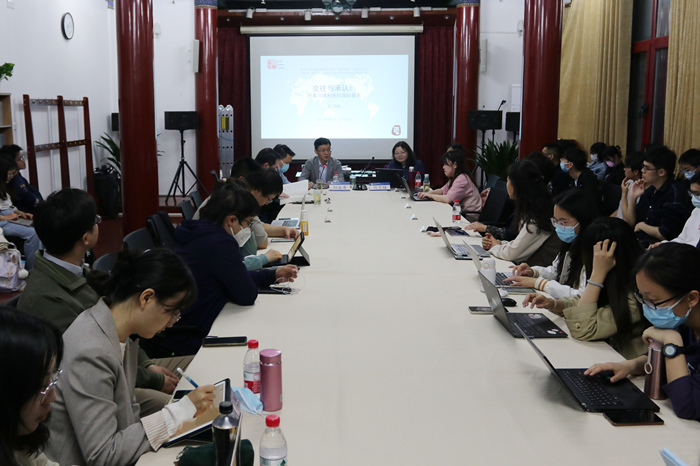On the evening of April 22, 2022, the Institute of International and Strategic Studies (IISS), Peking University (PKU) held a series of lectures under the 57th “North Pavilion Seminar”. Qian Xuemei, Speical Research Fellow of IISS and Professor of the School of International Studies (SIS), PKU, delivered a lecture entitled “Interactions and Recognition: International Ties of the Afghan Taliban”. The lecture was hosted by Gui Yongtao, Vice President of IISS, PKU and Vice President of SIS, PKU.

Prof. Qian Xuemei firstly gave an overall introduction on the Taliban. The organizational nature of the Taliban evolved in different historical periods. Initially, it emerged as a grass-roots organization of self defence movement among the tangles of warlords in Afghanistan. Later, the Taliban ushered in its first time of administration after successfully seizing power, but received a“collective punishment” following the 9/11 attacks. After the United States launched the war in Afghanistan, the Taliban entered a period of rebellion with close links to Al-Qaida until it peacefully returned to power on August 15, 2021.
Prof. Qian then introduced the different types and historical evolution of Afghanistan's international ties. The state interacts with three types of entities in the international community, including countries, international organizations and transnational actors. For Afghanistan, what counts the most is the relations with the first type, including the neighboring countries like Pakistan, Iran, Uzbekistan, and India, and major countries like the United States. The second type is represented by the United Nations and the third one by Al-Qaida. Historically, the factors influencing Afghanistan's international ties include: the political status of the Taliban; geopolitical and economic interests, especially relations with neighboring countries; great power politics and great power will which means that Afghanistan is bound to be the target of contention among great powers; the religion, culture, ideology and historical memory of Afghanistan.
Prof. Qian further elaborated on the new Taliban regime and its international exchanges. In terms of the number of overseas visits, reception of visits and participation at international conferences since the formation of the provisional government on September 7, 2021, the Taliban has been receiving great attention from the international community and been actively involved in international exchanges.
Based on that, Prof. Qian analyzed the relationship between international exchanges and diplomatic recognition. She pointed out that the Taliban's international exchanges are mainly in the field of international assistance and cooperation in security and development. To win the recognition of the international community, the Taliban needs to further meet its expectations of “building an open and inclusive political structure, implementing a moderate and stable domestic and foreign policy, and resolutely fighting against all kinds of terrorist forces”. However, it should be noted that there is a gap between the expectations by the international community and the capabilities of the Taliban. Therefore, not only does the Taliban need to make greater efforts for improvement to meet the requirements, but the international community also should consider whether its “criteria of recognition” is reasonable.
Finally, Prof. Qian Xuemei concluded that we should go beyond the one-sided perception of Afghanistan shaped by some media and try to explore a multi-faceted Afghanistan. First of all, lack of international recognition does not equal absence of international interactions; Secondly, access to aid does not equal achievement of development and Taliban is currently seeking a path of independent development that does not rely on aid; finally, the end of the war in Afghanistan does not equal political reconciliation or peace. There are still many destabilizing factors in Afghanistan.
In the Q&A section, Prof. Qian discussed with the faculty and students present at the lecture a series of topics, including the importance of international recognition, the relationship between the Taliban and Al-Qaida, the situation of the former regime’s embassies abroad, and the domestic challenges faced by the Taliban (including the food crisis, wealth gap, religious conflicts, and the future policies in such areas as women and foreign investment).
Editor: Li Fangqi Photographer: Zheng Peijie

